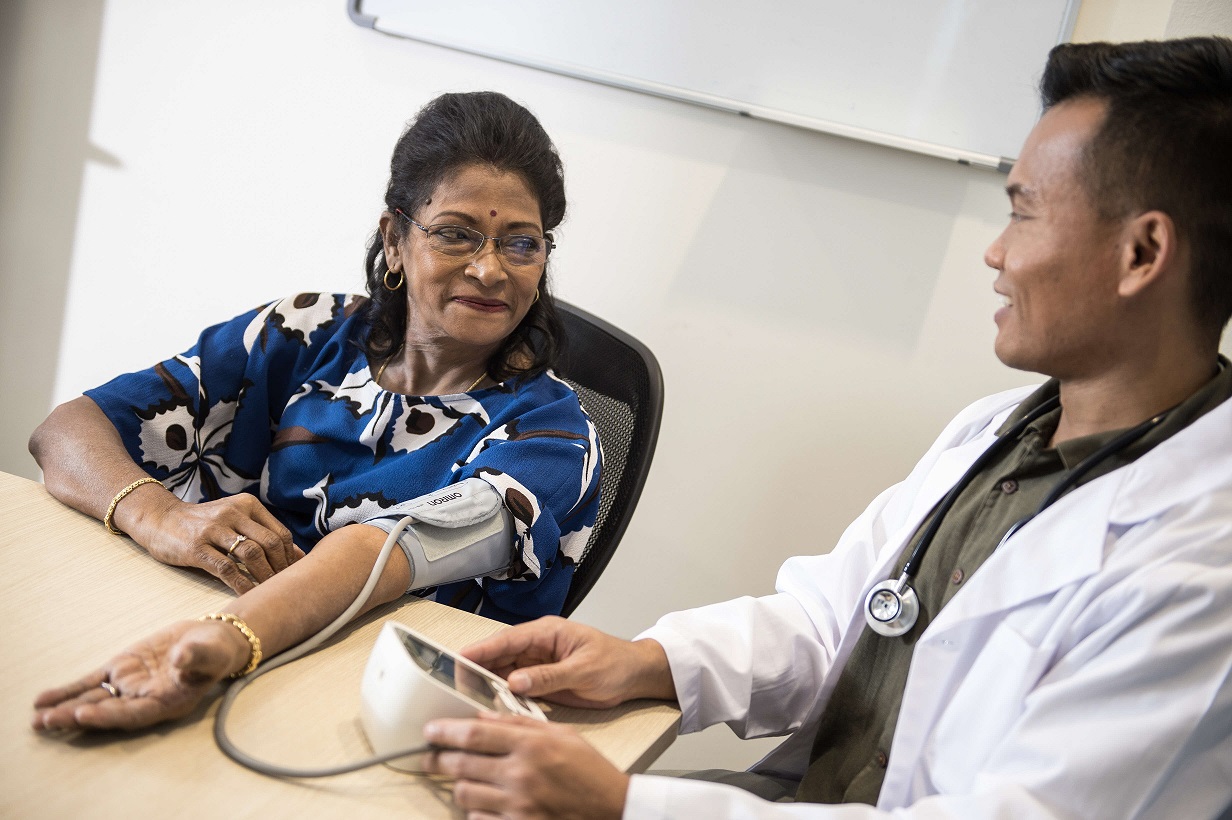14 July 2023
SOURCE: CPF Board

Retirement marks the start of the next exciting chapter in life. It may feel like yesterday when you started your first job, and before you know it, you're embarking on an exciting journey of newfound freedom and opportunities.
Amidst all the excitement of retirement, there is one essential aspect that can go unnoticed: the importance of keeping both your body and mind active.
The transition from work to retirement can be challenging. For retirees without concrete plans, mind-numbing boredom can set in if they do not participate in meaningful activities.
This boredom might then lead to negative feelings of loneliness, affecting the general well-being of retirees. That’s why it is important to stay connected with your loved ones and develop new structures in retirement. After all, the secret to a healthy and happy life lies in being both physically and mentally active.
But what happens when health issues get in the way of enjoying your retirement? It can be frightening to suffer from an illness that affects both the body and mind, such as dementia.
Let’s have a closer look at what this disease is and what you can do to prevent it from disrupting your retirement plans.
The two most common types of dementia are Alzheimer’s disease and vascular dementia. According to the Ministry of Health, one in 10 people above the age of 60 suffers from dementia in Singapore. This corresponds to approximately 82,000 individuals in 2018, with the number of dementia patients projected to increase to 152,000 by 2030 due to an ageing population.
Alzheimer's disease is a condition that affects parts of the brain that control thought, memory, and language. This typically starts with mild memory loss and slowly leads to the loss of conversational skills and general responsiveness to the environment.
From the perspective of their loved ones and caregivers, Alzheimer’s disease causes patients to “lose themselves” and gradually transform into a different person. This experience can be incredibly painful, especially for those who hold precious memories with the patient.
The exact cause of Alzheimer's disease is not fully known, but it is likely a mix of genetic and lifestyle factors. While there are treatments that can manage symptoms and improve the quality of life of dementia patients, there is no cure for dementia. This makes it important to detect dementia early and develop intervention plans for it.
Vascular dementia brings about progressive memory loss, a decline in intellectual ability (such as planning and making decisions), and changes in personality.
This condition happens when the blood supply to the brain is reduced due to damaged blood vessels. The brain cells are then deprived of oxygen and nutrients, affecting one’s thinking, learning, and decision-making abilities.
- Age
- Genetics and family history
- Health conditions such as high blood pressure, high cholesterol, and diabetes
- Lifestyle choices, including obesity, diet, and smoking
Age is the largest risk factor for dementia, followed closely by genetics and family history. Studies have also shown that maintaining an active lifestyle and engaging in healthy mental stimulations help in reducing the risk of developing dementia.
Additionally, those with pre-existing health conditions are at a heightened risk of developing vascular dementia due to an increased likelihood of blood vessel clots or brain bleeds.
Dementia is a complex condition that can be confused with normal ageing. However, they are not the same.
Common signs of dementia include:
- Forgetfulness that significantly impacts day-to-day functioning
- Confusion related to time and place
- Challenges in performing familiar tasks
- Noticeable changes in personality or behaviour
- Misplacing items or having trouble finding them
Early diagnosis is important and can help slow the progression of dementia and improve the quality of life for dementia patients.
If you suspect that you or someone you know may be experiencing symptoms of dementia, it is advisable to consult your family doctor or seek a referral to a specialist.
You can also schedule an appointment at any of the eight Memory Clinics located islandwide. Note that subsidised fees require a referral from a polyclinic or a CHAS GP.
Although there is no guaranteed method to prevent dementia, studies suggest that adopting a healthy lifestyle can help reduce the risk of developing the condition.

Retirement offers a unique opportunity to focus on your own interests and well-being. However, due to a lack of stimulation, it can also be a time when brain function declines. Try these activities to keep your mind and body moving.
Mental stimulation
One of the best ways to keep the brain active and challenged is to take part in mentally stimulating activities.
This could include anything from reading to learning something new. Participating in classes or workshop is a great way to keep the brain occupied as well – don’t forget to use your SkillsFuture Credit!
Physical exercise
Physical exercise helps increase blood flow to the brain, delivering precious oxygen and essential nutrients that contribute to brain health.
A good thing about physical exercise is that you can do it with your loved ones. This way, you can kill two birds with one stone by enjoying both physical exercise and social interaction!
Eating healthily
A healthy diet can go a long way to preventing dementia. Eating clean not only improves your overall well-being, but also strengthens your immune system and lowers the risk of cardiovascular diseases.
Fruits and vegetables are rich in vitamins and minerals and are highly beneficial for your general health. A great starting point is to include two servings of fruit and two servings of vegetables into your daily diet!
While retirement can provide an opportunity to take part in your favourite activities and interests, it can also lead to extended periods of being alone. This prolonged isolation may have a negative effect on your mental health and can even lead to dementia.
Overcoming loneliness and depression in retirement
A lack of mental stimulation can contribute to feelings of boredom, loneliness and even depression. That’s why it’s important to stay mentally active.
Enjoying the independence to pursue your own passions is a great way to stay mentally stimulated. The ability to rely on yourself and be self-sufficient is one of the greatest gifts that you have, so cherish it!
Discovering a sense of purpose and belonging can also help with loneliness. Imagine waking up each morning with something meaningful to do. This would certainly give you something to look forward throughout your day.
Social interaction keeps the brain active
We are forced to think and communicate in new ways when we interact with others. This helps to keep the brain active and engaged.
From spending quality time with family to reconnecting with old friends, there are many ways to stay socially active in retirement. You can also join other like-minded retirees in social groups and clubs to explore similar interests as well!
Doing the things you love
Retirement presents an opportunity to indulge in activities that bring you joy. However, it's also equally important to seek out new experiences that captivate your interests and actively challenge you.
Taking part in volunteer work serves as an excellent way to remain both mentally and physically active. It allows you to donate your time to a meaningful cause and give back to the community.

Chronic conditions such as diabetes and hypertension are also linked to dementia. Studies have also suggested that adults with diabetes have a higher risk of developing Alzheimer’s Disease.
If not properly managed, chronic conditions can lead to serious complications and result in costly treatments along with lengthy hospital stays. However, with early detection and good management, these complications can be avoided or delayed.
This makes treating chronic conditions and going for regular health screenings a must in both ageing gracefully and preventing dementia. After all, you want to feel your best in your golden years.
The MediSave for the Chronic Disease Management Programme (CDMP) covers 23 conditions, including dementia, hypertension and diabetes. Under the CDMP, more than 1,250 GP clinics, polyclinics, public hospitals and participating private specialist clinics in Singapore can provide chronic disease management.
Through the MediSave 500/700 scheme, those looking to claim under the CDMP can utilise their MediSave savings to lessen the financial burden of outpatient bills. Patients with complex chronic conditions can access up to $700 of their MediSave savings annually, while others with non-complex conditions can utilise up to $500 per year. Note that each claim is subject to a 15% co-payment in cash.
Ageing gracefully in retirement does not have to be a lonely journey. Embrace the opportunity to learn new things and connect with others! Both your brain and body will appreciate the benefits in the years to come.
Your retirement is the culmination of your hard work throughout your career. It deserves to be a period which you can enjoy with peace of mind.
That is why it’s important to have your basic needs met, such as having some form of income to rely on if you fall sick. The CPF savings that you’ve accumulated through the years are meant to help you with these basic financial needs - so that you can focus on the things that matter the most to you.
Remember that it's not the number of candles on the cake that matters, but the precious moments and experiences that truly define your golden years. Here’s wishing you a joyful and fulfilling retirement!
The information provided in this article is accurate as of the date of publication.


